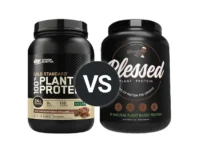Knowledge BaseYou're Questions Answered
Does protein powder build muscle without working out?
Protein powder is a dietary supplement that provides concentrated protein, an essential macronutrient required for muscle repair, growth, and overall bodily function. While protein intake plays a critical role in muscle development, consuming protein powder alone, without engaging in resistance or strength training, is unlikely to result in significant muscle gain. Muscle growth (hypertrophy) primarily occurs in response to mechanical stress from exercise, particularly weight-bearing or resistance-based movements.
Why Protein Alone Doesn't Build Muscle
1. Muscle Growth Requires Stimulus
Muscle protein synthesis (MPS) is the process by which the body builds new muscle tissue. While dietary protein provides the building blocks (amino acids), it is exercise, especially resistance training, that triggers the stimulus necessary to initiate MPS at levels that result in hypertrophy1. Without this stimulus, additional protein intake will support bodily maintenance, but not significant new muscle growth.
2. Excess Protein Without Training Is Stored or Excreted
When protein intake exceeds the body's needs and there is no stimulus for muscle repair or growth, the surplus amino acids are either oxidized for energy or converted to glucose or fat. This means that simply consuming protein powder in the absence of exercise will not lead to increased muscle mass and could, in some cases, contribute to unwanted weight gain2.
3. Protein Supports Recovery, Not Initiation of Growth
Protein plays a supportive role in muscle recovery and adaptation after physical stress. It helps repair damaged muscle fibers and enables them to grow stronger. However, without that initial damage from exercise, the body has no reason to upregulate muscle protein synthesis beyond baseline needs.
When Protein Powder Still Has Value Without Exercise
Although protein powder won’t build muscle without training, it may still offer benefits in certain scenarios:
- Preventing Muscle Loss: In older adults or individuals who are temporarily inactive (e.g., during injury recovery), adequate protein intake may help reduce muscle wasting3.
- Filling Dietary Gaps: Protein powder can be a convenient way to meet daily protein needs, particularly for those with limited access to protein-rich foods or higher-than-average requirements.
- Weight Management: Protein promotes satiety and may help regulate appetite and reduce caloric intake, which can assist with weight control.
So, protein powder alone will not build muscle without exercise. Resistance training provides the necessary stimulus for muscle growth, while protein supports the repair and rebuilding process. Without that stimulus, protein intake will serve maintenance functions or be used as an energy source. For optimal muscle gain, protein supplementation should be combined with consistent strength training and a balanced diet.
- Phillips, S. M. (2014). A brief review of critical processes in exercise-induced muscular hypertrophy. Sports Medicine, 44(1), 71–77.
- Tipton, K. D., & Wolfe, R. R. (2004). Protein and amino acids for athletes. Journal of Sports Sciences, 22(1), 65–79.
- Paddon-Jones, D., & Rasmussen, B. B. (2009). Dietary protein recommendations and the prevention of sarcopenia. Current Opinion in Clinical Nutrition and Metabolic Care, 12(1), 86–90.
Related Questions
Related Reviews

Your Answer
We are a participant in the Amazon Services LLC Associates Program, an affiliate advertising program designed to provide a means for us to earn fees by linking to Amazon.com and affiliated sites.



